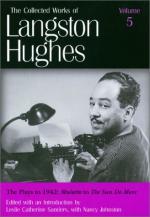|
This section contains 7,513 words (approx. 19 pages at 400 words per page) |

|
In the following essay, Bienvenu examines the nuances of racial prejudice practiced by blacks against other blacks in Mulatto.
It is obvious that Langston Hughes's 1935 play Mulatto: A Tragedy of the Deep South concentrates on the unrelenting abuse that Southern blacks suffered at the hands of whites in the first part of the twentieth century. Continually, grotesque white characters come in and out of the play like ogres, ready to pounce upon nonwhite victims at the slightest provocation. But while such racist abuse is perhaps the most prominent feature of this story of racial mixing in the Deep South, it is certainly not the only concern to which Hughes calls attention. Like many writers of the Harlem Renaissance, Hughes is also concerned with prejudice within the black race. Mulatto displays, as effectively as any Renaissance work, the peculiar situation of blacks' harboring prejudices against fellow blacks. In...
|
This section contains 7,513 words (approx. 19 pages at 400 words per page) |

|




